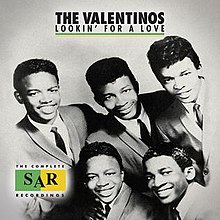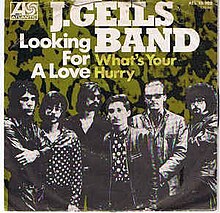
Robert Dwayne Womack was an American singer, musician and songwriter. Starting in the early 1950s as the lead singer of his family musical group the Valentinos and as Sam Cooke's backing guitarist, Womack's career spanned more than 60 years and multiple styles, including R&B, jazz, soul, rock and roll, doo-wop, and gospel.
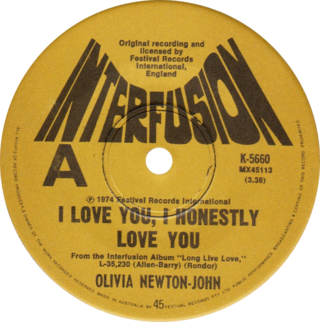
"I Honestly Love You" is a song recorded by Olivia Newton-John released in 1974 on the album Long Live Love in United Kingdom and If You Love Me, Let Me Know in the United States. The song became a worldwide pop hit, her first number-one single in the United States and Canada. The single was first released in Australia as "I Love You, I Honestly Love You", as per its chorus. The song was written by Jeff Barry and Australian singer and composer Peter Allen. The latter recorded it around the same time for his album Continental American.

"Ooo Baby Baby" is a song written by Smokey Robinson and Pete Moore. It is a classic 1965 hit single by The Miracles for the Tamla (Motown) label. The song has inspired numerous other cover versions by other artists over the years, including covers by Ella Fitzgerald, Todd Rundgren, The Escorts, The Five Stairsteps, Linda Ronstadt, and many others. The Miracles' original version of "Ooo Baby Baby" is listed as number 266 on Rolling Stone Magazine's list of "The 500 Greatest Songs of All Time".
Cecil Dale Womack was an American singer, songwriter and record producer. He was one of the musical Womack brothers, and had success both as a songwriter and recording artist, notably with his wife Linda as Womack & Womack. In later years he took the name Zekkariyas.

"You Send Me" is a song written and originally recorded by American singer Sam Cooke, released as a single in 1957 by Keen Records. Produced by Bumps Blackwell and arranged and conducted by René Hall. The song, Cooke's debut single, was a massive commercial success, becoming a No. 1 hit on both Billboard's Rhythm & Blues Records chart and the Billboard Hot 100.
"I'm in Love" is a song written by Bobby Womack. It was first recorded by Wilson Pickett in 1967, which gave him a top-ten R&B hit on Billboard's chart in 1968, peaking at number 4 as well as peaking at number 45 on the Billboard Hot 100.
"If I Were a Carpenter" is a folk song written by Tim Hardin in the 1960s, and re-recorded with commercial success by various artists including Bobby Darin, The Four Tops and Johnny Cash. Hardin's own recording of the piece appeared on his 1967 album Tim Hardin 2. It was one of two songs from that release performed by Hardin at Woodstock in 1969. The song, believed by some to be about male romantic insecurity, is rumored to have been inspired by his love for actress Susan Morss, as well as the construction of Hardin's recording studio.
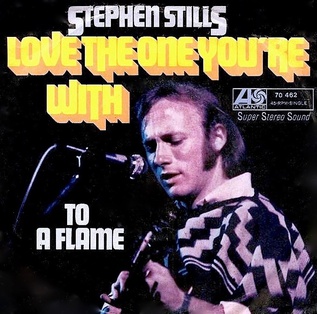
"Love the One You're With" is a song by American folk rock musician Stephen Stills. It was released as the lead single from his debut self-titled studio album in November 1970. The song, inspired by a remark Stills heard from musician Billy Preston, became his biggest hit single, peaking at No. 14 on the Billboard Hot 100 in early 1971. David Crosby and Graham Nash, Stills' fellow members of Crosby, Stills & Nash, provide background vocals on the song. Also providing the backups are Rita Cooledge, her sister Priscilla Jones, and John Sebastian. They all sing the "Do Dos" that come before the instrumental portion and the Outro. The song was also recorded by other pop musicians, notably the Isley Brothers, The Meters, Bucks Fizz, Luther Vandross, Bob Seger and Richard Clapton.
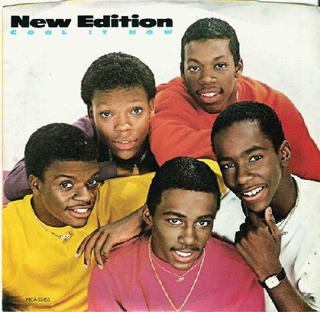
"Cool It Now" is a 1984 hit single by American group New Edition, and is the first single from their eponymous second album, New Edition. In the US, the song entered the Hot Black Singles chart on September 1, 1984. The song peaked at number 4 in January 1985 on the Billboard Hot 100 chart. Lyrically, the song depicts a guy professing his love for a girl, despite growing concerns from his friends.
"It's All Over Now" is a song written by Bobby Womack and his sister-in-law Shirley Womack. It was first released by The Valentinos, featuring Bobby Womack, in 1964. The Rolling Stones heard it on its release and quickly recorded a cover version, which became their first number-one hit in the United Kingdom, in July 1964.

"Travelin' Man" is an American popular song, best known as a 1961 hit single sung by Ricky Nelson. Singer-songwriter Jerry Fuller wrote it with Sam Cooke in mind, but Cooke's manager was unimpressed and did not keep the demo, which eventually wound up being passed along to Nelson. His version reached No. 1 on the Billboard Hot 100. It was released as a double A-side with "Hello Mary Lou", which reached No. 9 on the same chart. In the United Kingdom, "Travelin' Man", coupled with "Hello Mary Lou", reached No. 2, becoming Nelson's biggest UK hit. Nelson is accompanied on the recording by the vocal quartet, The Jordanaires.

Womack & Womack was the singing and songwriting partnership of married American musicians Linda Womack and Cecil Womack. The duo were successful as songwriters for other artists, and had several international hits as a singing duo in the 1980s and 1990s. Later recordings with other members of their family were credited to The House of Zekkariyas.
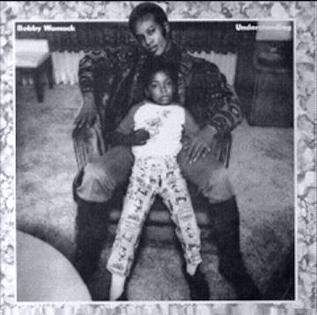
Understanding is the fourth studio album by American musician Bobby Womack. The album was released on March 30, 1972, by United Artists Records. Womack recorded Understanding in Memphis, Tennessee at American Sound Studio and in Muscle Shoals Sound Studios in Muscle Shoals, Alabama. At Muscle Shoals, he utilized top session players, including drummer Roger Hawkins, guitarists Jimmy Johnson and Tippy Armstrong, bassist David Hood and keyboardist Barry Beckett.
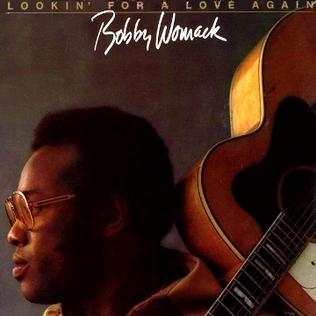
Lookin' for a Love Again is the sixth studio album by American musician Bobby Womack. The album was released on January 11, 1974, by United Artists Records. The album reached #85 on the Billboard U.S. Pop Charts and #5 on the Billboard R&B Charts. It included the hit single "Lookin' for a Love", which charted No. 1 on the Billboard R&B Singles chart and #10 on the Billboard Hot 100.
"There! I've Said It Again" is a popular song written and published by Redd Evans and David Mann in 1941. In early 1945, Vaughn Monroe and his Orchestra released Victor 20-1637, which reached the number one position on the Billboard's National Radio Airplay chart for five straight weeks, then no.2 for six more weeks, and a total run of 29 weeks. It finished 1945 as the no. 4 record of the year.
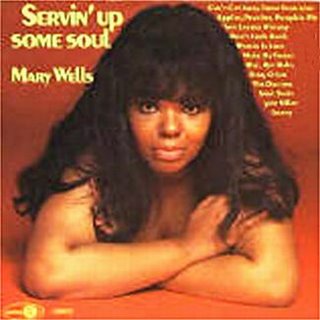
Servin' Up Some Soul is the eleventh overall album by R&B singer Mary Wells, released in 1968 on the Jubilee record label. Her first and only release with the once-fabled R&B company yield a modest charter with "The Doctor", Wells' final top 100 hit on the pop charts though Wells would continue to have R&B hits. It was her final album for thirteen years until 1981's In and Out of Love.
"(Sweet Sweet Baby) Since You've Been Gone" is a song by singer Aretha Franklin. Released from her Lady Soul album in 1968, the song was successful, debuting at number 31 and peaking at number 5 on the Hot 100 for five weeks, and spending three weeks at number 1 on the Hot Rhythm & Blues Singles chart. The B-side, "Ain't No Way", was also a hit, peaking at number 16 on the Billboard Hot 100 and number 9 on the Hot Rhythm & Blues Singles chart.
"I Can Understand It" is a soul classic written and originally recorded by rhythm and blues musician Bobby Womack, who originally recorded the song for his top ten album, Understanding, released in late 1972. The Womack version was done in a more blues style.
Harris "Harry" Womack was an American singer and musician, most notable for his tenure as a member of the family R&B quintet The Valentinos.
The Valentinos was an American family R&B group from Cleveland, Ohio, best known for launching the careers of brothers Bobby Womack and Cecil Womack. Bobby went on to find greater fame as a solo artist while Cecil became successful as a member of the husband and wife duo of Womack & Womack with Linda Cooke. The group was well known for R&B hits such as the original versions of "Lookin' for a Love", notably covered by the J. Geils Band and later a solo hit for Bobby Womack, and "It's All Over Now", covered by the Rolling Stones.
